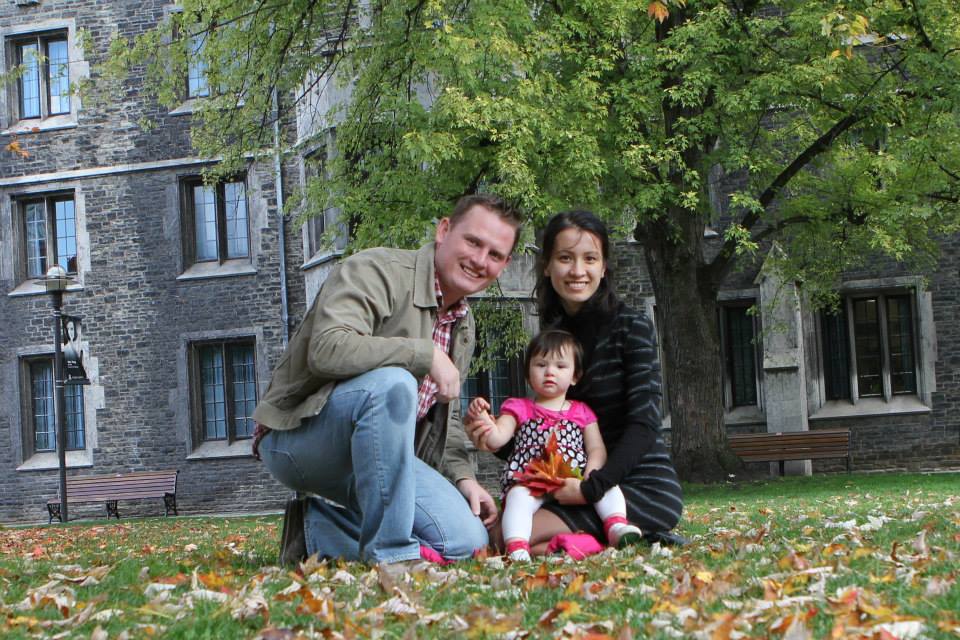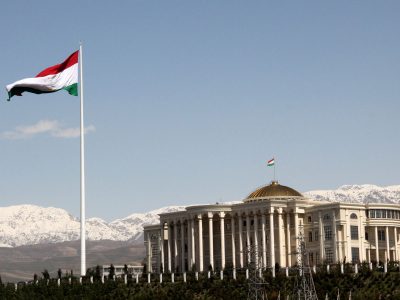
Alex Sodiqov with his wife and daughter. Shared via www.freesodiqov.org
This story is part of our campaign #FreeAlexSodiqov: GV Author Detained in Tajikistan. A version of this post was originally written in Russian on the Tajik blogging platform blogiston.tj and translated for Global Voices by Chris Rickleton. The author wishes to remain anonymous.
About six weeks ago in Khorog police detained my good friend, the young academic Alexander Sodiqov. Disregarding the principle of the presumption of innocence and the laws of our own country, the State Committee for National Security (GKNB) issued a statement to the press the following day, in which Alexander was accused of “espionage” on behalf of “a foreign state.” Later, when Alexander was finally allowed access to independent lawyers, it was reported that Alexander had been charged under Article 305 of the Criminal Code (“Treason”).
I wanted to write about Alexander even then, but as I was neither a relative nor a lawyer, I decided to leave it to the professionals. Exactly one week ago, on July 22 after nearly 40 days in jail, Alexander was released on bail, apparently upon condition of remaining in the country. As I understand, the charges against Alexander have still not been lifted: he is still awaiting trial and is still charged under Article 305, which carries a sentence of between 12 and 20 years.
After his release, Alexander gave only two interviews, one to Asia Plus and one to Radio Ozodi. As far as I know, many journalists from other publications also wanted to talk to him, but he refused to be interviewed. Most likely this is due to the very conditions of his bail, although it may be something else. I, too, have been unable to talk with Alexander since his release.
Now I want to share my view on this matter. Alexander Sodiqov, who our law enforcement agencies have rushed to write into the ranks of state criminals, is a young academic working on his Ph.D. in Canada. To find this out and read his biography in full it is sufficient to type his name into Google or Yandex.
There has been much online discussion regarding Alexander, and many of our citizens (especially those who do not have enough intelligence to enter a foreign university) have reproached Alexander for choosing to study at a western university.
Certainly, Alexander earned his Master's degree in the UK and is working on his doctoral thesis in Canada. However, prior to doing both of those things he graduated as a student from the Russian-Tajik Slavic University (RTSU) in Tajikistan, where he subsequently went on to teach having received his Masters from England. As one of his students, I can say that he was one of the most knowledgeable and professional teachers at the university.
Moreover, is receiving a degree in the West some sort of crime or reprehensible action? Tens of thousands of young Tajiks – including the children of highly-placed officials – prefer to get an education abroad. It is not punishable by our laws, and therefore we cannot throw accusations at Alexander for worthily representing our country at leading western universities.
Alexander also wrote a lot about our country. We bloggers in Tajikistan should be grateful for his work at Global Voices, where he constantly highlighted issues discussed through social networks and blogs in Tajikistan. Thanks to him, we were heard by a wider audience, while in our own country we are more often than not neither heard nor listened to.
Firstly, regarding the charges brought against Alexander, I personally think these accusations are absurd. First, Alexander did not hide from anyone either the nature of the research he was working on or the fact he was going to Khorog. We, friends of Alexander, knew perfectly well when and why he was going to Khorog. And, once in Khorog, he openly met with representatives of civil society on a bench in a central park. I do not think that spies behave this way. Real spies are extremely difficult to catch precisely because they operate covertly, secretly, not openly, as Alexander acted.
Secondly, the arrest of Alexander generated a huge buzz. The world's leading media, including The Guardian, The Economist, New York Times, Washington Post, The Globe and Mail, Toronto Star, Huffington Post, BBC, Reuters, Al Jazeera, EurasiaNet, Registan, Open Democracy, and many other publications wrote about his arrest. Major universities and academic associations quickly came out in support of Alexander, while thousands of academics from hundreds of the most prestigious universities (including Harvard, Oxford and Cambridge) and research centers in the world demanded that the Tajik authorities release Alexander, withdraw the charges levelled against him and allow him and his family to return to Canada so he can continue his studies.
People studying and teaching in countries as diverse as Austria, Australia, Belgium, Brazil, Bulgaria, Canada, China, Costa Rica, France, Georgia, Germany, Greece, Hungary, Italy, Indonesia, Japan, Mexico, Netherlands, Nigeria, Pakistan, Peru, Portugal, Russia, Serbia, Singapore, Slovenia, South Africa, Spain, Switzerland, Thailand, USA and the UK, as well Tajikistan's neighbors such as Afghanistan. Kazakhstan, Kyrgyzstan, Turkmenistan and Uzbekistan have all pledged support for the campaign to #freealexsodiqov.
Never have so many famous academics, research centers and universities stood up in such solidarity for a spy. Everyone who follows the news knows that the detention of spies usually passes without fuss or hype. After that, arrested spies are quietly exchanged for other arrested spies or released following inter-governmental bargaining. Well-known Western scholars would never put their signatures towards supporting the rights, integrity and reputation of a person in whom they lacked faith. These academics value their name and reputation, and if they have come out in support of Alexander, his honesty cannot be in doubt.
That broad support that Alexander received from so many academics led the governments of Canada, the United Kingdom and the United States to demand that our government release him. Without this support, I think it would have been much harder for Alexander to convey his innocence. After all, Alexander and his wife are citizens of Tajikistan.
Thirdly, the fact that Alexander has been released from prison (albeit on bail) speaks to the fact that law enforcement agencies do not have anything to hold against him that could be considered evidence of Alexander's involvement in the offenses he has been accused of. Our law enforcement agencies have worked well and correctly: a citizen was detained, investigated for involvement in a crime, and let go once no evidence linking him to any crime was found. That is how law enforcement agencies around the world work. I am personally very pleased that in this case, our state organs have not lost face and, as noted in Alexander's recent interviews with Asia Plus and Ozodi, have worked “professionally”.
So, why is Alexander still facing charges?
This is not yet clear. I think the whole thing amounts to a quarrel within our government. Bringing Khorog under government control, we have been told, is the responsibility of a presidential aide, former Defense Minister Sherali Khairullayev. This is the same Khairullayev that shamed himself in 2012 by sending a 3,000-strong military detachment to Khorog but singularly failing to apprehend any of the “criminals” on the government's wanted list. For this Khairullayev it is becoming harder and harder to answer before the president for the continued unrest in GBAO [the province where Khorog is situated], and so he pushes the line of “foreign spies” conducting “subversive activities” and funding “state criminals” in Badakhshan.
From what I have heard from unofficial sources, it is Khairullayev that ordered Sodiqov's arrest – hoping that no one would intercede on his behalf, since Alexander does not have influential relatives – with the ultimate aim of presenting him before a court, the president and the country as a “Western spy” carrying out “subversive activities” in Khorog.
Unfortunately for Khairullayev it did not work out as planned.
The GKNB leading the investigation correctly understood the situation and reported to Khairullayev that they had nothing with which to hold Alexander. Western governments, funding our security services and all of our social programs – did you really think that these programs are financed from the state budget? – demanded Alexander's release. Foreign Minister Aslov, meanwhile, who has had to answer for Khairullayev's nonsense in the international arena, seems himself to be convinced of the absurdity of the charges brought against Alexander.
In order to minimize the loss of branding to our country and prove our professionalism, our state bodies must now close the case against Alexander, take him to the airport and put him on a flight to Canada. This they will confirm their professionalism and impartiality. And Khairullayev, the presidential aid should be removed. He has once again demonstrated he is incompetent. I think his position could be taken up by Saymumin Yatimov, who currently heads the GKNB.
Although Alexander's case will now be decided at the highest level, each of us can make a small contribution to his full release. I urge you all to take a minute of your time and sign the petition to withdraw all charges against Alexander.
This petition will soon be sent to the presidential administration and the Ministry of Foreign Affairs of Tajikistan.



